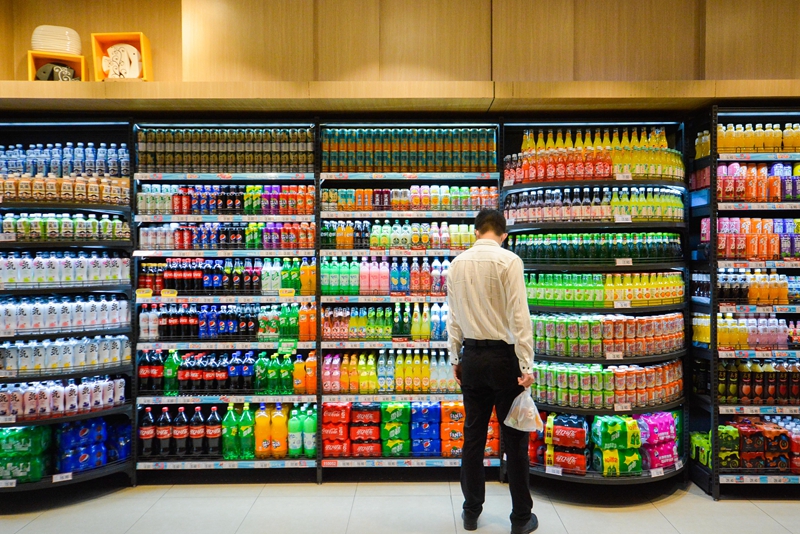Vendors often sell nearly expired food at lower prices to quickly reduce stocks as the food items approach their expiration date. In 2020, the total output value of China's snack food industry exceeded 3 trillion yuan ($464 billion). Even if calculated by 1-percent inventory, the market size of the nearly expired food industry should be 30 billion yuan ($4.6 billion), and it has huge growth potential, showed a report by iiMedia Research, a data-mining and analysis company.
"Although the products are near expiration, they are not expired. Is there any reason not to buy what you like for less money?" Peng told Beijing Review. "For me, it's like a treasure hunt full of surprises."
Quality and affordability
About 48 percent of the nearly expired food consumers are aged 26 to 35, and most consumers buy such food mainly out of impulse, according to iiMedia Research. "When I stand in front of the near-expiration section of the supermarket, I can't help thinking if I don't take them, it will be my loss. As I always go home with a full bag, sometimes I have to overeat so as to finish them in time," Peng, 29, said.
In terms of the definition of nearly expired food, there is currently no clear national standard, but some provinces and cities have adopted regulations on it. For example, Beijing launched a regulation in 2012, giving definitions for nearly expired food. According to the city's standard, the shorter the shelf life of the food is, the shorter nearly expired period it gets. Most canned food, candies and biscuits which have shelf life of one year or longer can be categorized as nearly expired food when there are 45 days before expiration; for fresh milk and tofu in boxes that have a shelf life of fewer than 15 days, they can be called nearly expired food when there are one to four days left before the use-by date. There are more categories in between.
Besides stipulating similar definitions, Shanghai also regulates labels for nearly expired food. It is stipulated that if regular food is sold in a bundle with nearly expired food, or the latter is used as a gift, a "near expiration date" label shall be affixed to the nearly expired food where it is noticeable for consumers. When being bundled, the production date and shelf life of the food must not be covered.
According to an anti-food waste law that took effect in April, supermarkets and shops should categorize and manage food items near the expiration date, and make special labels for them or sell them together in one section.
In addition to chain supermarkets, there are also small family-run businesses and shops that only sell nearly expired food and beverages. Many of them are near residential communities or office buildings.
"Most customers who come to my store are young office ladies, retirees or college students," Liu Huijuan, the owner of a nearly expired food store in Beijing with an area of only a little more than a dozen square meters, told Beijing Review, adding that a large number of her visitors are repeat customers. "When they first came, they would buy only a few items to try them out. The more they come, the bigger their shopping bags get," she said.
Besides alluring prices and good quality, some people buy nearly expired food partly because they want to contribute their share in the nationwide Empty Your Plate campaign launched in 2013 to reduce food wastage. "If I buy nearly expired food, then there will be less that goes in the garbage. I'm saving resources and protecting the environment while meeting my needs," Peng said.
Peng is also a follower of an online "I love nearly expired food" group set up in September 2020 on information-sharing platform Douban, where over 75,000 young people a day share tips on buying nearly expired food.
Recently, a WeChat applet called Precious SH Map has gained popularity among nearly expired food lovers in Shanghai. One of the functions of the applet is offering information of local nearly expired goods stores, as well as details on when a bakery or a supermarket offer discounts. The applet's designer has initiated a non-profit program to cooperate with stores and make full use of nearly expired and expired food so as to reduce wastage.
Zhang Xuefeng, an industry observer, told Global Times that another reason for young people to buy nearly expired goods is lack of money. Limited wages and high living costs such as rent compel them to seek inexpensive quality goods.
While some customers enjoy the advantages of nearly expired, some others are concerned about the safety of such food. But when properly consumed, such products won't harm health, according to Zhu Yi, an associate professor with the College of Food Science and Nutritional Engineering at China Agricultural University.
"Selling nearly expired food while still ensuring safety reduces waste and also helps people live a more sustainable lifestyle. Nevertheless, nearly expired products should be properly labeled," Zhu said.
Booming market
Brick-and-mortar chain shops selling food nearing the expiry date are catching the eyes of both customers and investors. For example, Shihuibang, a startup established in March, has already attracted tens of millions of yuan in angel financing. HotMaxx, a chain store that opened last year in major Chinese cities, has expanded to more than 200 outlets across the country.
Online shops selling nearly expired food are growing rapidly, too. Over 60 percent of China's food purchases were made through e-commerce apps in 2020, according to iiMedia Research's report.
According to Taobao, China's online shopping platform, 2.1 million people buy nearly expired food every year on average, with potato chips, instant noodles and beverages among the best sellers.
One reason behind the rising popularity for soon-to-expire food sold online is the fast development of the e-commerce and delivery industry. Express delivery services make it possible for customers to receive the food before it expires, Zhang said.
However, the market supervision department should step up inspections on nearly expired goods, according to Zhang Ziping, an expert with China Meat Association. "More checks should be conducted at the warehouses and physical stores," he said, adding the standards for businesses to handle such food need refinement.
(Print Edition Title: Time Is Money)















